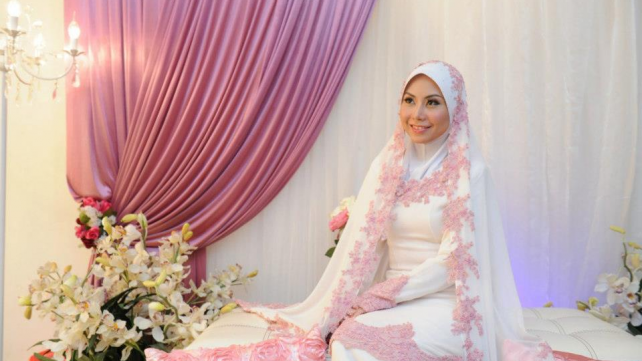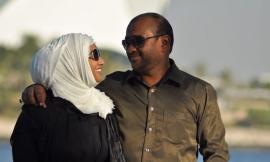
Quran and Hadith about marriage. What does Nikah mean and what does it take to enter into a marriage agreement in Islam? It is a strong contract or covenant (mithaqun Ghalithun) as expressed in Quran 4:21.
Mutual Agreement of Bride and Groom
Marriage (nikah) is a solemn and sacred social contract between bride and groom. This contract is a strong covenant (mithaqun ghalithun) as expressed in Quran 4:21. The marriage contract in Islam is not a sacrament. It is revocable.
Both parties mutually agree and enter into this contract. Both bride and groom have the liberty to define various terms and conditions of their liking and make them a part of this contract.
Mahr
The marriage-gift (Mahr) is a divine injunction. The giving of mahr to the bride by the groom is an essential part of the contract.
'And give the women (on marriage) their mahr as a (nikah) free gift" (Quran 4:4)
Mahr is a token commitment of the husband's responsibility and may be paid in cash, property or movable objects to the bride herself. The amount of mahr is not legally specified, however, moderation according to the existing social norm is recommended. The mahr may be paid immediately to the bride at the time of marriage, or deferred to a later date, or a combination of both. The deferred mahr however, falls due in case of death or divorce.
One matrimonial party expresses 'ijab" willing consent to enter into marriage and the other party expresses 'qubul" acceptance of the responsibility in the assembly of marriage ceremony. The contract is written and signed by the bride and the groom and their two respective witnesses. This written marriage contract ("Aqd-Nikah) is then announced publicly.
Sermon
The assembly of nikah is addressed with a marriage sermon (khutba-tun-nikah) by the Muslim officiating the marriage. In marriage societies, customarily, a state appointed Muslim judge (Qadi) officiates the nikah ceremony and keeps the record of the marriage contract. However any trust worthy practicing Muslim can conduct the nikah ceremony, as Islam does not advocate priesthood. The documents of marriage contract/certificate are filed with the mosque (masjid) and local government for record.
Prophet Muhammad (S) made it his tradition (sunnah) to have marriage sermon delivered in the assembly to solemnize the marriage. The sermon invites the bride and the groom, as well as the participating guests in the assembly to a life of piety, mutual love, kindness, and social responsibility.
The Khutbah-tun-Nikah begins with the praise of Allah. His help and guidance is sought. The Muslim confession of faith that 'There is none worthy of worship except Allah and Muhammad is His servant and messenger" is declared. The three Quranic verses (Quran 4:1, 3:102, 33:70-71) and one Prophetic saying (hadith) form the main text of the marriage. This hadith is:
'By Allah! Among all of you I am the most God-fearing, and among you all, I am the supermost to save myself from the wrath of Allah, yet my state is that I observe prayer and sleep too. I observe fast and suspend observing them; I marry woman also. And he who turns away from my Sunnah has no relation with me". (Bukhari)
The Muslim officiating the marriage ceremony concludes the ceremony with prayer (Dua) for bride, groom, their respective families, the local Muslim community, and the Muslim community at large (Ummah)
Marriage (nikah) is considered as an act of worship (ibadah). It is virtuous to conduct it in a Mosque keeping the ceremony simple. The marriage ceremony is a social as well as a religious activity. Islam advocates simplicity in ceremonies and celebrations.
Prophet Muhammad (S) considered simple weddings the best weddings:
'The best wedding is that upon which the least trouble and expense is bestowed". (Mishkat)
Primary Requirements
- Mutual agreement (Ijab-O-Qubul) by the bride and the groom
- Two adult and sane witnesses
- Mahr (marriage-gift) to be paid by the groom to the bride either immediately (muajjal) or deferred (muakhkhar), or a combination of both
Secondary Requirements
- Legal guardian (wakeel) representing the bride
- Written marriage contract ("Aqd-Nikah) signed by the bride and the groom and witnesses by two adult and sane witnesses
- Qadi (State appointed Muslim judge) or Ma'zoon (a responsible person officiating the marriage ceremony)
- Khutba-tun-Nikah to solemnize the marriage
The Marriage Banquet (Walima)
After the consummation of the marriage, the groom holds a banquet called a walima. The relatives, neighbors, and friends are invited in order to make them aware of the marriage. Both rich and poor of the family and community are invited to the marriage feasts.
Prophet Muhammad (S) said:
'The worst of the feasts are those marriage feasts to which the rich are invited and the poor are left out". (Mishkat)
It is recommended that Muslims attend marriage ceremonies and marriage feasts upon invitation.
Prophet Muhammad (S) said:
"...and he who refuses to accept an invitation to a marriage feast, verily disobeys Allah and His Prophet". (Ahmad & Abu Dawood)
Printed with permission: Marriage and Family in Islam by Mohammad Mazhar Hussaini








Comments
Why you are saying that you
Why you are saying that you are praying God while you are judging others i thought the only person who must do all the judging park is God. I feel sorry for Muslim bcus they think they are the only one who pray to God and not other religions I'm a Christian married to Muslim but they Muslims consider them as the best people than other religions
Location
Why are you saying that?
For a Muslim marriage to be accepted in the eyes of Allah ('s.w.t) both parties have to be muslim .... so ur marriage is not halal ... please refrain from preaching with out knowledge about the topic.... thanks ... much appreciated
Location
Please refrain from
Please refrain from misinforming people. Muslim men can marry both Christian and Jewish women, it's in the Quran.. and is very much acceptable. Genius!
Location
Judging others
Hi. I'm Muslim and I wanted to marry my Christian partner. We used to have many discussions about the differences in our faiths and cultures. I am more than aware of the situation you talk of, so I felt I should reply. My parents asked him to convert and he did, but now they are forcing him to learn the whole faith quickly and he'll end up like you, angry.
It's not Islamic to judge a people or a faith. We are taught not to tell others that they are wrong, we are taught to teach them what we believe in,to make them understand. But, human beings are human beings, they are mean and judgemental. It's true, there are many differences in how we worship, in the end, the Holy Father you pray to is our Holy Father too. Allah, in Arabic can't simply be translated to 'God'. It's The Creator, the Master of the Day of Judgement, and all the likes put together. So as Muslims, to not lose the meaning of the word, we use Arabic. Just as many languages can't simply be translated to English without losing some parts of the meanings.
Please do not be let down by what other people say, there is a difference between faith and culture. My advice to you would be to embrace this saying,
"Let your deeds, not your words, be your adorning"
No matter what people say to you, reply them with peace. If they judge you, pray for their forgiveness. Respond to anger with happiness. It's a hard thing to do, but with practice, it will get easier.
In short, they are wrong.they have wronged you because they have made you feel anger towardsa whole people. A whole faith. I'm really sorry for what you are going through. I apologise on their behalf.
All my love kindness and love towards you.
Location
i want to ask this question..
i want to ask this question...a man who is happily married to a single wife,though he has the capability of marrying a second wife but not interested. this is not to go against any law either from the book or hadith. what did you see to it.
Location
if parents are not agree for
if parents are not agree for marrage but a girl and a boy they reli want to marry eac hother and they do nikha but no one nows is nikha complete
Location
Yes you can , if you have
Yes you can , if you have proper adult witnesses.
Its good to invite everyone in the nikah especially parents but when you do something halal and you know its the wise choice you can surely do so.
JazakaAllah
Regards
For details please refer to mufti
BEST WAY 2 MARRY
BEST WAY 2 MARRY
Location
I am engaged to a muslim man and I am studying Islam and I am just very grateful for all of the comments here.
Location
Agar ladka or ladki phone par nikah kubool karte he to kya wo nikah ho jata he ??? or agar us nikah ko register karwana ho to kya ho sakta he????
Location
Pages
Add new comment